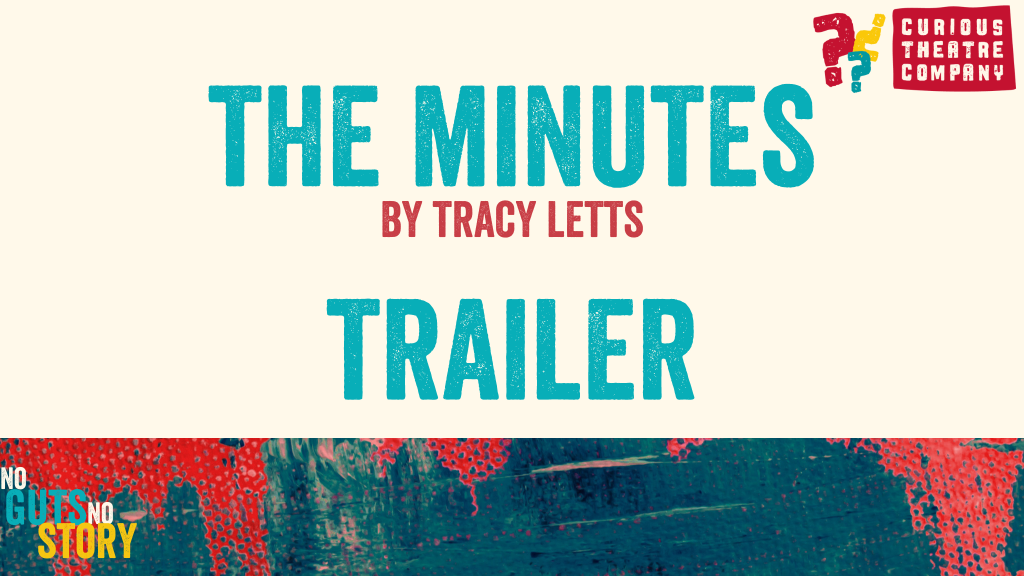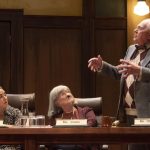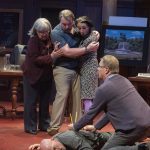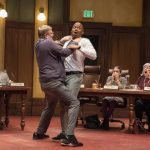- Tracy Letts
- Christy Montour-Larson
- Sept 9 - Oct 14
- Sept 7 - 8
- Buy Now
Regional Premiere
Hilarious. Dynamic. Shocking.
The smallest towns keep the biggest secrets. Buckle up for a scathing new comedy about small town politics and real world power from one of the great writers of American Theatre today. This Tony-nominated, Pulitzer-finalist and Broadway hit will receive its Regional Premiere, filled with an ensemble of Curious favorites, featuring 15 Curious Artistic Company members on and off stage. You will find it hysterical, shocking, hilarious, familiar, and horrific—in short, exactly what bureaucratic politics is all about.
Looking for the Playbill? Click HERE!
Dates & Times
| Date | Time | Additional Information |
Cast
Production Team
- Markas Henry, Scenic Designer
- Brynn Starr Sater, Costume Designer
- Richard Devin, Lightning Designer
- Jason Ducat, Sound Designer
- Annette Westerby, Props Artisan
- Wayne Breyer, Stage Manager
- Evette Srouji, Assistant Director
- Krystyna Pinel, Assistant Stage Manager
- Joshua Danger Emerson, Cultural Consultant
- Diana Dresser, Movement Consultant
Sponsors
Season Sponsors
Dr. Jan Kennaugh & Chip Horne
Diana & Mike Kinsey
Susan & Jeremy Shamos
The Harold & Mimi Steinberg Charitable Trust
Gold
Alyssa Williams
Silver
Judy Cadwallader
GO DEEPER with Curious & THE MINUTES by Tracy Letts!
- The Playwright
- City Councils Behaving Badly
- History and The Battle of Mackie Creek
- Discussion Questions
- The Ending
The Playwright: Tracy Letts
Tracy S. Letts (born July 4, 1965) is an American actor, playwright, and screenwriter. He started his career at the Steppenwolf Theatre before making his Broadway debut as a playwright for August: Osage County (2007), for which he received the Pulitzer Prize for Drama and the Tony Award for Best Play. As an actor he won the Tony Award for Best Actor in a Play for the Broadway revival of Who’s Afraid of Virginia Woolf? (2013).
Letts was born in Tulsa, Oklahoma, to author Billie Letts and college professor and actor Dennis Letts, a member of the Muscoee (Creek) Tribe. His grandfather was born in Native American territory. Letts said, “When you grow up in Oklahoma and you have Native American blood, that heritage is embedded in your DNA. The subject of the genocide of Indigenous people is an important subject to me, my family, where I come from.” Letts graduated from Durant High School in the early 1980s. Bullied and unpopular as a teenager, he moved to Dallas, where he waited tables and worked in telemarketing while beginning his acting career.
Letts moved to Chicago at the age of 20, working for the next 11 years at Steppenwolf Theatre Company, where his is still an active member. In 1991, Letts wrote the play Killer Joe. Two years later, the play premiered at the Next Lab Theater in Evanston, Illinois, followed by the 29th Street Rep in New York City. Since then, Killer Joe has been performed in a number of countries in 12 languages.
As a playwright, his works also include: Bug, (produced at Curious in 2003) Man from Nebraska, August: Osage County, Superior Donuts, Linda Vista, and The Minutes. Letts adapted three of his plays into films, Bug, Killer Joe and August: Osage County. Superior Donuts was adapted into a television series of the same name.
Letts’s plays have depicted people struggling with moral and spiritual questions. He says he was inspired by the plays of Tennessee Williams and the novels of William Faulkner and Jim Thompson. “I don’t know what it says about me that I have a greater affinity with the damaged. Probably nothing good.”
The Minutes has its premiere at the Steppenwolf Theater in Chicago on November 9, 2017, and began previews at the James Earl Jones Theatre in New York City on February 25, 2020. It was scheduled to open on March 15, 2020, but due to the COVID-19 pandemic, production was suspended. The production ultimately opened on April 17, 2022, at Studio 54. In 2018, The Minutes. was nominated for the Pulitzer Prize for Drama. The Minutes. was also nominated for the 2022 Tony Award for Best Play, the Drama League Award and the Outer Critic Circles Award.
In film and television, Letts is known for his portrayal of Andrew Lockhart in seasons 3 and 4 of Showtime‘s Homeland, and pyramid-scheme con-artist Nick on the HBO comedy Divorce. In 2017, Letts starred in three critically acclaimed films: Azazel Jacobs‘ The Lovers, Greta Gerwig‘s Lady Bird, and Steven Spielberg‘s The Post. In 2019, he portrayed Henry Ford II in James Mangold‘s Ford v Ferrari and Mr. Dashwood in Gerwig’s Little Women, the two also receiving Best Picture nominations.
His mother, Billie Letts, has said of his work, “I try to be upbeat and funny. Everybody in Tracy’s stories gets naked or dead.”
Interested in more about Tracy Letts? Check out Understanding Tracy Letts by Thomas Fahy
City Councils Behaving Badly
The Minutes is Tracy Letts’s first overly political play, but he admits that “all of my plays are somewhat political.” The idea of city council meetings intrigued Letts, and he watched hundreds of hours of them on YouTube in preparation for writing the script. As he notes, These meetings, “while unbelievably boring,” also reflect “the work of the people.” If you get a new street sign on your street, it’s because somebody had a meeting about it in a town council meeting.” Check out these video clips of City Council Members behaving badly. (Compiled by Evette Srouji)
Council Members Resign Over Corruption
Heated Argument on US House Floor
Parliament Meeting in Jordan gone very wrong (outside of US perspective)
History and the Battle of Mackie Creek
“And I can see that something else died there in the bloody mud, and was buried in the blizzard. A people’s dream died there. It was a beautiful dream.” From Black Elk Speaks by Black Elk, a holy man of the Oglala Lakota people.
“As we’ve continued to work on the play, we have made sure that I’ve consulted with Native voices. There are no Native characters on stage, but we’ve consulted with those voices just to make sure that we’re saying what we want to say in the way that we want to say it. And we’ve had very positive response to all that.” – Tracy Letts
In our research, we discovered many connections to the fictional Battle of Mackie Creek in The Minutes and other genocidal efforts by the United States government to forcibly remove native people from their land.
“I suggest we take a moment to reflect on the meaning of November 29, 1872”: The Sand Creek Massacre was a massacre of Cheyenne and Arapaho people by the U.S. Army on November 29, 1864, when a 675-man force of the Third Colorado Cavalry under the command of Colonel John Milton Chivington attacked and destroyed a village of native people in southeastern Colorado Territory killing an estimated 150 peaceful Native people, and mutilating an estimated 69 to mostly women and children. Hundreds more were mutilated. The Joint Committee on the Conduct of the War conducted an investigation of the massacre, but while they condemned Chivington’s and his soldiers’ in the strongest possible terms, no court-martial proceedings were brought to bear against him or them. The only punishment Col. Chivington suffered was public exposure and the end of his political aspirations.
Learn More About The Sandy Creek Massacre:
- Watch: Colorado Experience: The Sand Creek Massacre
- Visit: History Colorado: The Sand Creek Massacre
“There is much activity from the Sioux in this area, Mr. Farmer.”: In June, 1964, The Hungate family was murdered about 25 miles southeast of downtown Denver. The bodies were exhumed, brought to Denver, and publicly displayed. With no evidence, many Coloradans speculated that Cheyenne or Arapaho were to blame for the family’s murder inciting paranoia about impending Indian attacks. The territorial governor of Colorado, John Evans, called on citizens to “kill and destroy” hostile natives and raised a new regiment, led by Chivington.
“They said we had stolen eggs from a white family near to us along the river.”: Between 1837 and 1858, the Dakota tribes agreed to a series of treaties that exchanged Dakota land for money and food. At the same time, the US government passed a number of policies encouraging settlement along the western frontier, including the creation of the state of Minnesota. Eventually, the Civil War meant the US government had fallen seriously behind on its payments and delivery of food, leaving the Dakota on the verge of starvation. This, combined with an influx of American settlers, meant the Dakota had no way of feeding themselves. The situation would come to a head in the summer of 1862 when a Dakota hunting party allegedly stole eggs from settlers.
“He put the ear on a string with other ears.” After the smoke cleared, at the Sandy Creek Massacre, Chivington’s men came back and killed many of the wounded. They also scalped many of the dead, regardless of whether they were women, children, or infants. Chivington and his men dressed their weapons, hats, and gear with scalps and other body parts, including human fetuses and male and female genitalia. They also publicly displayed these battle trophies in Denver’s Apollo Theater and area saloons.
“They gave a lot of those soldiers medals for what they had done that night.” On December 29, 1890, U.S. soldiers killed hundreds of Lakota men, women, and children at Wounded Knee on the Pine Ridge Indian Reservation in South Dakota during what came to be known as the Wounded Knee Massacre. Congress awarded twenty Medals of Honor to soldiers for the shameful acts that occurred during the Wounded Knee Massacre. The Remove the Stain Act would rescind these Medals of Honor.
Discussion Questions
- Have you ever been involved in a public process before? (Worked for the government, went to a city council meeting, or even just watched CSPAN procedures?) How does the way the Big Cherry City Council members behave relate to your own experiences?
- In what way to the names of the characters increase your understanding of who they are? What does your name say about you?
- Why do you think the lights in the city council meeting room kept flickering and buzzing? Why was Mr. Peel the only one to really acknowledge this phenomenon? And what was up with those ants?
- The town of Big Cherry is experiencing a lot of rain. What did it mean to you?
- How does the name of the town and its original origins relate to your own experience? What other stories of erased history are you familiar with?
- The play has been called “funny, until it isn’t”. When was it funny for you? When was it not?
- How did you feel the set, lights, costumes and sound added to your experience of the play?
- Lett’s has said he has used Shirley Jackson’s short story “The Lottery” (1948) as a reference point. Where do you see the connection?
- What do you think of Mr. Peel’s decisions at the end? What do you hope he would do? What would you do?
The Ending
(CAUTION: Major Spoilers Ahead!)
Thoughts About the Ending:
“What often happens in plays of mine … we go from a sort of hyper-realism to a more expressionistic moment. I think it’s more about the way it makes it feel rather than what happens or any intellectual understanding of what happens.” – Tracy Letts
“Letts is a playwright who reliably goes to extremes. So, the wildly theatrical denouement of The Minutes will come as no surprise to his fans. It makes for an ugly and shocking — but also wholly appropriate — adjournment to an electrifying meeting with America’s shame.” – Peter Marks, The Washington Post
“Cultural appropriation is actually one of the themes that the play gets into a little bit. I feel pretty confident that we’re not blindly stumbling into some problematic area. We’ve really stepped into the problematic area, and the play kind of takes it on. That’s in some ways, what the play is all about.” – Tracy Letts
“There is a certain poetic justice to the finale because it represents one final appropriation. The more I thought about the ending, the more I decided that The Minutes really had to end this way. But that doesn’t make it any more pleasant to have experienced it.” – By Christopher Caggiano, The Arts Fuse.
“The ending is so stunning and so powerful, and it so undoes what we thought we understood, that it takes time to process. This play demands discussion and thought; it is provocative in the best sense of the word: it provokes the mind to work to consider what it has just witnessed and to find ways to understand it. I don’t say “understand it fully,” as I am certain that even a close reading of the text would leave room for interpretation; no, I say “understand,” as in make your own meaning from.” – By Karen Topham, Chicago Onstage
“Ultimately, I came to feel that if it is the theater’s main business to mirror who we are — to act, like the minutes of a meeting, as an absolute record of what we say and how we behave — then The Minutes does what a play aimed mostly at white people must. It shows us how we are starting to understand, but still mostly failing to accept, that our privileges are tied to a history of denying them to others. I think it is warning us, in its own dramatic way, to do better, before the minutes, as they will, harden into millenniums.” – Jessie Green, The New York Times
“People have mixed reactions towards the ending, but I’ll be honest, it was stuck in my mind all night. I kept realizing more and more! So, I think it works well for the play.” Reddit contributor.
Foreshadowing of the ending in the script:
PEEL: Did I miss anything last week? I heard some of the fellows in the parking lot talking about Mr. Carp.
JOHNSON: I’m sure you’ll learn what you need to know.
BLAKE: A bad man down is no tragedy.
BREEDING: Good to have you back. We need more of your kind around here.
INNES: The events of last week’s meeting still loom large for every member here.
OLDFIELD: Now friends, I fully expect you’re going to throw me on the floor and kick me in the face, but I assure you I have no ideas what is happening.
MATZ: We don’t all get on the ark. Two of every species. Only two of us get to go.
JOHNSON: This view was rejected and Mr. Carp’s tenure with the council was completed.
JOHNSON: Given the high emotion of the proceedings, Mayor Superba called an end to the meeting before any other agenda items could be considered. Closing ceremony. The meeting was concluded at 8:18pm.
CARP: What are you guys gonna do, make me disappear?
Bonus Discussion Questions:
- In addition to Shirley Jackson’s short story “The Lottery”, Letts has also referenced Roman Polanski’s Rosemary’s Baby (1968) Where do you see the connection?
- What do you think of Tracy Lett’s quote above about the expressionist moments in his work? How did the ending make you feel?
- Want to see the last page of the script? Click HERE! How does this inform your understanding of the play?
What is the runtime of this show?
It is running at 90 minutes.
Is there an intermission?
There is no intermission.
Are there any advisories I should know about?
Curious offers a public advisory about any stage effect of potential concern to patrons’ health, such as strobe lights, theatrical fog or smoking.
Please click here to view all applicable advisories regarding this show! However as sensitivities vary from person to person, if you have any other concerns about content or age appropriateness that might have a bearing on patron comfort, please contact the Box Office at 303.623.0524.
Can I bring my kids?
We require that audience members find alternative activities for children under 6 years of age. In addition, our material may not be appropriate for young people under 14 years of age. We will gladly discuss subject matter with parents or guardians before the performance in order to make an informed decision for you and your child. Before purchasing tickets, please email or call our Box Office at 303.623.0524.
Where can I park?
At this time, the parking lot across the street at the Zing Credit Union is still closed due to construction. The parking lot located directly south of the Curious building (mural side) is available for parking free of charge. However, spots are limited so please plan to arrive early to secure a spot and be sure you place a Curious Parking Pass in your dashboard so we know you’re with us!
If there are no spots available in our parking lot when you arrive, please try one of the following options:
- Street parking is free in our neighborhood after 6pm Monday – Saturday and all day Sunday
- Acoma Street Parking Garage located at 1120 Acoma Street
- Parking Pay Lot located at 1056 Acoma Street
- Parking Pay Lot located at 1055 Lincoln Street
Note that the lot next to Curious is only available for the two hours before a performance and one hour following; Curious does not own the lot and the owners will tow vehicles left past midnight.
Is Curious wheelchair accessible?
Yes. However, due to the age of our building (1890s!), there are a few quirks to our accessibility. When buying tickets, know that Rows F & G are fully wheelchair accessible and all seats are removable. All seats on the orchestra level of the theatre are accessible to those with mobility concerns, however, the other rows of the orchestra do involve a small step up and the seats are fixed. The balcony of Curious is only accessible by stairs.
The front entry of Curious is stairs-only, so those with mobility concerns or in a wheelchair may enter the building through the double red doors on the south side of the building (where you will also find accessible parking spaces) beginning 30 minutes before the show. Please let the ushers or staff know that you have arrived so we may greet you if we miss you slipping in.
May I eat/drink in the theatre?
You bet! Our main bar, The Sanctuary, is on the balcony level and carries wine, beer, and bourbon in addition to treats, chips, coffee, water, and soft drinks. We also have a new auxiliary bar, The Confessional, located in the back right corner of our orchestra. All are permitted in your seats, although we ask that you unwrap any candy before the show begins.
Where do I pick up my tickets?
If you selected Print-at-Home, simply print out the PDF that was emailed to you or show that attachment on your phone to the ushers when you arrive, no need to see the box office. If you have selected Will Call for your tickets, please reach out to our Box Office as we no longer print-out tickets.
Can I change my tickets to another performance?
Usually, yes. If you know your dates have changed, do contact us as soon as possible to ensure comparable seats are available for your new date. Sometimes our shows do sell out and occasionally an entire run will sell out. So it is always best to call early with a change.
What if I arrive late?
Patrons who arrive late will be seated at the discretion of the House Manager, and may not be seated in their assigned seats until intermission. In the event that a performance runs without an intermission, latecomers will be seated in a location that will not disrupt the performers or other audience members. We reserve the right to deny admission to latecomers when a performance has been running for 15 minutes or more.
Will the show go on in a snowstorm?
Curious will make every possible attempt to continue with a scheduled performance in inclement weather. However, in the VERY RARE case that local authorities deem it unsafe, we will alert all patrons of the canceled performance and reschedule you following our return to normal operations. Should you feel personally unsafe driving in weather, you are encouraged to call the box office to move to a later performance if one is available.
Is it cold/hot in the theatre?
While we make every attempt to ensure our patrons and performers are comfortable in our space, Curious is in a church built in the 1890s; we have no A/C or central air (although we do have two swamp coolers and radiant heat). Temperature control can be a challenge in the extreme cold or extreme heat of Colorado. We encourage you to wear light layers to ensure your comfort.
Do you offer group discounts?
Yes! Call the box office to get a quote for the performance you would like to attend. Discounts vary by performance.
How can I become a volunteer?
Call or email the box office for information on joining our volunteer corps.
Can I get the program ahead of time?
Yes. About one week before the show opens, you can find our full program HERE!
In Media
- Horror and twisted humor collide in Curious Theatre [Company]'s production of 'The Minutes'
Anyone who's watched a few city council sessions knows they're better for falling asleep than keeping you glued to the screen. But Curious Theatre [Company]’s season opener, a new Tracy Letts play set during a small-town council meeting, shows municipal government can indeed deliver both brutal drama and unexpected comedy. The play opens with the council trying to approve the official record of their recent meeting. The body’s newest member, returning from an absence, questions what happened to the minutes from the last meeting, and why one of their colleagues seems to have disappeared along with them. From there, the evening unfolds into a meticulously constructed horror show, dripping with the original sins of American democracy...
- The Minutes Reveals the Dark Underbelly of Small-Town Politics at Curious Theatre [Company]
Curious Theatre Company's epic 26th season kicks off with a roller coaster of political satire and dark humor in its regional premiere of Tracy Letts's Broadway hit The Minutes. This season is also the company's first since 1997 without founders Chip Walton and Dee Covington, but the upcoming production signifies that Curious remains true to its mission of producing thought-provoking, challenging and socially relevant plays...
- Burning down the house: ‘The Minutes’ dives deep into American privilege
At Curious Theatre, a first-rate cast delivers with Tracy Letts’ funny, shocking play. Tracy Letts’ play The Minutes unfolds in two distinct chapters. One is a very funny situational comedy about the members of a city council wrangling over seemingly nonsensical items like creating a fundraiser by having a mixed-martial artist dressed as Abraham Lincoln taking on all comers. Or more serious things like whether to make a proposed fountain ADA accessible and why attendance at the town’s annual festival is declining...
- Small talk gives way to horror in “The Minutes” at Curious Theatre [Company]
The ability of the horror genre to take on systemic violence has become a rich conversation in literature and film. On the civic-minded set of “The Minutes,” things get very strange, even funny, before going downright dark. Tracy Letts’s Pulitzer Prize-nominated drama about a city council meeting gone awry launches the new season at the Curious Theatre Company with artistic aplomb and to roiling effect. Letts, the author of the family meltdown drama “August: Osage County,” brings his knack for the implosive to what should be a routine Big Cherry city council meeting — if only Mr. Peel (played with hapless decency by Josh Robinson) would stop asking about the absence of Mr. Carp (Erik Sandvold)...
- Shocking and Hilarious; The New Curious Theatre Offering Will Leave You Thinking. Hard.
The Minutes, with its large cast, is especially risky to produce as the theatre world emerges by degrees from the emptiness and distress of the pandemic: “We could do one-two- or three-person plays, but you get tired of that eventually,” Christy says, adding that she’s pleased at the opportunity to employ so many Curious company members in The Minutes: “Nobody took a hit in the theatre community more than actors did. And also it’s fun to work together...”




























